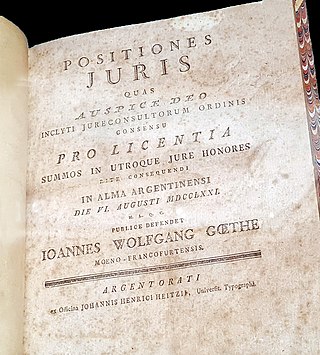
Postgraduate education, graduate education, or graduate school consists of academic or professional degrees, certificates, diplomas, or other qualifications usually pursued by post-secondary students who have earned an undergraduate (bachelor's) degree.
An academic degree is a qualification awarded to a student upon successful completion of a course of study in higher education, usually at a college or university. These institutions often offer degrees at various levels, usually divided into undergraduate and postgraduate degrees. The most common undergraduate degree is the bachelor's degree, although some educational systems offer lower-level undergraduate degrees such as associate and foundation degrees. Common postgraduate degrees include engineer's degrees, master's degrees and doctorates.
A bachelor's degree or baccalaureate is an undergraduate degree awarded by colleges and universities upon completion of a course of study lasting three to six years. The two most common bachelor's degrees are the Bachelor of Arts (BA) and the Bachelor of Science. In some institutions and educational systems, certain bachelor's degrees can only be taken as graduate or postgraduate educations after a first degree has been completed, although more commonly the successful completion of a bachelor's degree is a prerequisite for further courses such as a master's or a doctorate.

A thesis, or dissertation, is a document submitted in support of candidature for an academic degree or professional qualification presenting the author's research and findings. In some contexts, the word thesis or a cognate is used for part of a bachelor's or master's course, while dissertation is normally applied to a doctorate. This is the typical arrangement in American English. In other contexts, such as within most institutions of the United Kingdom and Republic of Ireland, the reverse is true. The term graduate thesis is sometimes used to refer to both master's theses and doctoral dissertations.
A Doctor of Medicine is a medical degree, the meaning of which varies between different jurisdictions. In the United States, and some other countries, the M.D. denotes a professional degree. This generally arose because many in 18th-century medical professions trained in Scotland, which used the M.D. degree nomenclature. In England, however, Bachelor of Medicine, Bachelor of Surgery (M.B.B.S.) was used: in the 19th century, it became the standard in Scotland too. Thus, in the United Kingdom, Ireland and other countries, the M.D. is a research doctorate, honorary doctorate or applied clinical degree restricted to those who already hold a professional degree (Bachelor's/Master's/Doctoral) in medicine. In those countries, the equivalent professional degree to the North American, and some others' usage of M.D. is still typically titled Bachelor of Medicine, Bachelor of Surgery.

A postgraduate diploma is a postgraduate qualification at the level of a master's degree, awarded after a university degree, which supplements the original degree and awards them with a graduate diploma. The minimum requirement of completing a Bachelor's degree is necessary to start the Postgraduate course. The duration of a Postgraduate course can vary from 1 year to 2 years.
A Doctor of Pharmacy is a professional doctorate in pharmacy. In some countries, it is a proficient graduate degree to practice the profession of pharmacy or to become a clinical pharmacist. In many countries, people with their Doctor of Pharmacy are allowed to practice independently and can prescribe drugs directly to patients. A PharmD program has significant experiential and/or clinical education components in introductory and advanced levels for the safe and effective use of drugs. Experiential education prepares graduates to be practice-ready, as they already have spent a significant amount of time training in areas of direct patient care and research.
A Bachelor of Medicine, Bachelor of Surgery is a medical degree granted by medical schools or universities in countries that adhere to the United Kingdom's higher education tradition. Despite the historical distinction in nomenclature, these degrees are typically combined and conferred together. This degree is usually awarded as an undergraduate degree, but it can also be awarded at graduate-level medical institutions. The typical duration for completion is five to six years.

A licentiate is an academic degree present in many countries, representing different educational levels. It may be similar to a master's degree when issued by pontifical universities and other universities in Europe, Latin America, and Syria.
A Master of Engineering is a professional master's degree in the field of engineering.
The Diploma of Education, often abbreviated to DipEd or GradDipEd, is a postgraduate qualification offered in many Commonwealth countries including Australia, Sri Lanka, New Zealand, and the United Kingdom.
Honours degree has various meanings in the context of different degrees and education systems. Most commonly it refers to a variant of the undergraduate bachelor's degree containing a larger volume of material or a higher standard of study, or both, rather than an "ordinary", "general" or "pass" bachelor's degree. Honours degrees are sometimes indicated by "Hons" after the degree abbreviation, with various punctuation according to local custom, e.g. "BA (Hons)", "B.A., Hons", etc. In Canada, honours degrees may be indicated with an "H" preceding the degree abbreviation, e.g. "HBA" for Honours Bachelor of Arts or Honours Business Administration.
A Diplom is an academic degree in the German-speaking countries Germany, Austria, and Switzerland and a similarly named degree in some other European countries including Albania, Bulgaria, Belarus, Bosnia and Herzegovina, Croatia, Estonia, Finland, Poland, Russia, and Ukraine and only for engineers in France, Greece, Hungary, North Macedonia, Romania, Serbia, Slovenia, and Brazil.
Business education is a branch of education that involves teaching the skills and operations of the business industry. This field of education occurs at multiple levels, including secondary and higher education
A Master of Philosophy is a postgraduate degree. It may be awarded to postgraduate students after completing taught coursework and one to two years of original research, which may also serve as a provisional enrolment for a PhD programme.
In Italy, the laurea is the main post-secondary academic degree. The name originally referred literally to the laurel wreath, since ancient times a sign of honor and now worn by Italian students right after their official graduation ceremony and sometimes during the graduation party. A graduate is known as a laureato, literally "crowned with laurel" and is awarded the title of dottore, or Doctor.
A magister degree is an academic degree used in various systems of higher education.
Master's degrees in Europe are the second cycle of the Bologna process, following on from undergraduate bachelor's degrees and preceding third cycle doctorates. Master's degrees typically take two years to complete, although the number of years varies between countries, and correspond to 60 – 120 ECTS credits. Within the European Higher Education Area, representing almost all countries in Europe, master's degrees are referenced to the Framework of Qualifications for the European Higher Education Area and national qualifications frameworks.

Sokoine University of Agriculture (SUA) is a public university in Morogoro, Tanzania, specializing in agriculture. The university is named after the country's second prime minister Edward Sokoine.
The University of Auckland Faculty of Science is one of eight faculties and schools that make up the University of Auckland.




